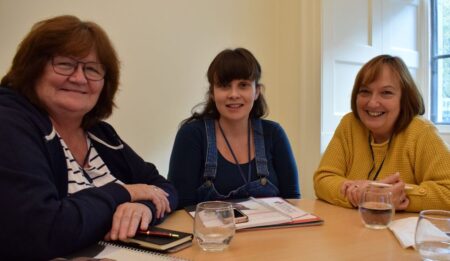Home News & Views Challenging perceptions: From NHS to care home
Challenging perceptions: From NHS to care home

l-r: Pat Cassidy with colleagues Becky Mullins and Cheryl Harborne
Pat Cassidy, Star and Garter Home, Solihull
Prior to joining the team at the Royal Star and Garter in Solihull, I worked in a variety of roles in the NHS spanning 35 years. I made the choice to broaden my experience and it was with some trepidation that I entered the care sector, as I too had heard lots of negativity about working in care homes. I hoped I would be able to dispel many of the myths and perceptions of others and hoped that what I heard through various media was the exception rather than the rule.
One of the first things that jolted my confidence was the realisation of how many strands there were to the job. I had been used to working with other professionals e.g. pharmacy services, stock ordering and control, I soon began to realise that as a registered nurse working in a care home, I have to be better than the rest. Not only was I using all the skills and knowledge I had gained throughout my career in the NHS, but I was also embracing a new model of dementia care. Taking advantage of training updates was crucial for me to deliver the best care possible. I realised that skills are vital; for example identifying the need to develop expert knowledge in areas such as safeguarding, deprivation of liberties (DoLS), infection control and wound care, to ensure that excellent care can always be delivered. This is important as there can be times when you’re the only regular (registered) member of the team and have to make decisions with just one chance to get it right.
Working in a care setting is also immensely responsible. The frailty and multiple chronic conditions of some of the residents can often make decisions about care very difficult, particularly for those who are living with dementia. When a person starts to deteriorate rapidly, having the ability to assess these changes and take action is what makes care home nursing so skilled. The home’s model of care and environment provides me the opportunity to develop relationships with residents. This consistency of care enhances my skills in a very distinctive way. It enables me to see the most minute changes and respond in an appropriate and timely way. The goal being able to avoid hospital admission through proactive management of ‘crises’.
In a care setting, sometimes you have to lead. At times there may not be colleagues available to problem solve with, and we do not have immediate access to a doctor to consult. I don’t think that being a care home nurse is a job that just anyone can do; you definitely need comprehensive experience to fall back on. You are at the front line when things go wrong so you need to be skilled in the management of multiple conditions, have robust clinical decision making ability and confidence in your practice.
I believe the nurses here at the Royal Star and Garter home provide outstanding care in all areas; however we probably do need to promote and showcase our skills more to encourage up and coming student nurses to want to work in our field with pride and satisfaction. I love how we deliver care that I believe is really person-centred, are innovative with our practice and that we lead and develop the team to do the same. I know there can be bad practice in the care sector, but the same can be said for other sectors too.
The best part of working at the Royal Star and Garter is feeling valued, part of a close knit team, sometimes challenged but well supported to give my personal best for the team and our residents. I would not wish for anyone to be here who doesn’t want to be the very best nurse they can be.
The misconceptions I had about care homes have been completely reversed, we provide an impressive range of services run to a high standard. I believe that the residents at the Royal Star and Garter home get real enjoyment and fulfilment living here.
Comments are closed.

